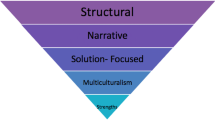Abstract
Gregory Bateson, who is regarded as one of the founders of the field of family therapy, warned about the dangers of chopping up the ecology (literally and metaphorically). Yet the ecosystem is showing signs of faltering under the pressure of human mistreatment, and increasingly people are manifesting symptoms associated with extreme disconnection from nature. Although family therapists have devoted little attention to the relationship between human and ecological planetary suffering, as systemically trained professionals MFTs are uniquely situated to see the big picture and to promote integrative healing between individual, familial, and environmental levels. This article explores some of the factors underpinning the field’s lack of attention to ecological issues and provides recommendations for how MFTs can remember the pattern that connects by cultivating a more eco-informed approach to training and clinical practice.
Similar content being viewed by others
References
Bateson, G. (1972). Steps to an ecology of mind. New York: Chadler.
Bateson, M. C. (2000). Forward by Mary Catherine Bateson. In G. Bateson (Ed.), Steps to an ecology of mind (pp. 7–14). Chicago: University of Chicago Press.
Becvar, D. S., & Becvar, R. J. (1999). Systems theory and family therapy: A primer (2nd ed.). New York: University Press of America.
Broderick, C. B., & Schrader, S. S. (1991). The history of professional marriage and family therapy. In A. S. Gurman & D. P. Kniskern (Eds.), The handbook of family therapy (Vol. 2, pp. 3–40). New York: Brunner/Mazel.
Burns, G. W. (1998). Nature-based therapy: Brief integrative strategies for health and well-being. New York: Taylor & Francis.
Burns, G. W. (2005). Naturally happy, naturally healthy: The role of the natural environment in well-being. In F. A. Huppert, N. Baylis, & B. Keverne (Eds.), The science of well-being (pp. 405–431). Oxford: Oxford University Press.
Burns, G. W. (2008). A therapy of ecology: Extending a systemic approach to depression. Family Therapy News, 7(6), 34–37.
Doherty, W., & Simmons, D. (1996). Clinical practice patterns of marriage and family therapists: A national survey of therapists and their clients. Journal of Marital and Family Therapy, 22(1), 9–25.
Gould, B. B., & DeMuth, D. H. (Eds.). (1994). The global family therapist: Integrating the personal, professional, and political. Boston: Allyn & Bacon.
Guttman, H. A. (1986). Epistemology, systems theories and the theory of family therapy. American Journal of Family Therapy, 14, 13–22.
Harper, S. (1995). The way of wilderness. In T. Roszak, M. E. Gomes, & A. D. Kanner (Eds.), Ecopsychology: Restoring the earth, healing the mind (pp. 183–200). San Francisco: Sierra Club Books.
Hecker, L., Mims, G. A., & Bougher, S. (2003). General systems theory, cybernetics and family therapy. In L. Hecker & J. Wetchler (Eds.), Introduction to family therapy (pp. 39–62). Binghamton, NY: Haworth.
Hendee, J. C. & Martin, V. G. (1994). International wilderness allocation, management and research: A symposium of the fifth world wilderness congress. Moscow, Idaho: Wilderness Research Center, University of Idaho.
Hernandez, B. C., & Doherty, W. J. (2005). Marriage and family therapists’ psychotropic medications: Practice patterns from a national study. Journal of Marital and Family Therapy, 31(3), 177–189.
Kanner, A. D., & Gomes, M. E. (1995). The all-consuming self. In T. Roszak, M. E. Gomes, & A. D. Kanner (Eds.), Ecopsychology: Restoring the earth, healing the mind (pp. 77–91). San Francisco: Sierra Club Books.
Louve, R. (2005). Last child in the woods: Saving our children from nature-deficit disorder. Chapel Hill, NC: Algonquin Books of Chapel Hill.
Minuchin, S., & Storm, C. (2000). Supervisors as social engineers: Creating family therapy-friendly organizations: An interview with Salvador Minuchin. In American Association for Marriage and Family Therapy (Ed.), Readings in family therapy supervision: Selected articles from the AAMFT Bulletin (pp. 59–60). Alexandria, VA: AAMFT.
Mirkin, M. P. (Ed.). (1990). The social and political contexts of family therapy. Boston: Allyn & Bacon.
Rainforest Alliance. (2004). Rainforest issues, Retrieved November 24, 2008, from http://www.amazonbioenergetics.com/rainforest.htm.
Roszak, T., Gomes, M. E., & Kanner, A. D. (Eds.). (2002). Ecopsychology: Restoring the earth, healing the mind (2nd ed.). San Francisco: University of California Press.
Simon, F. B., Stierlin, H., & Wynne, L. C. (1985). The language of family therapy: A systemic vocabulary and sourcebook. New York: Family Process Press.
Taylor, L. (2004). The healing power of rainforest herbs. Garden City, NJ: Square One.
Ungar, M., & Costango, L. (2007). Supervision challenges when supervisors are outside supervisees’ agencies. Journal of Systemic Therapies, 26(2), 68–83.
van Matre, S. (1990). Earth education: A new beginning. Greenville, WV: Earth Education Institute.
von Bertalanffy, L. (1968). General system therapy: Foundations, development, application. New York: Braziller.
Watzlawick, P., Beavin, J., & Jackson, D. (1967). The pragmatics of human communication. New York: W. W. Norton.
Weiner, N. (1954). Cybernetics, or control and communication in the animal and the machine (2nd ed.). Cambridge, MA: Massachusetts Institute of Technology Press.
Wilson, E. O., & Kellert, S. R. (1993). The biophilia hypothesis. Washington DC: Island Press/Shearwater Books.
Author information
Authors and Affiliations
Corresponding author
Rights and permissions
About this article
Cite this article
Laszloffy, T.A. Remembering the Pattern that Connects: Toward an Eco-Informed MFT. Contemp Fam Ther 31, 222–236 (2009). https://doi.org/10.1007/s10591-009-9092-8
Published:
Issue Date:
DOI: https://doi.org/10.1007/s10591-009-9092-8



